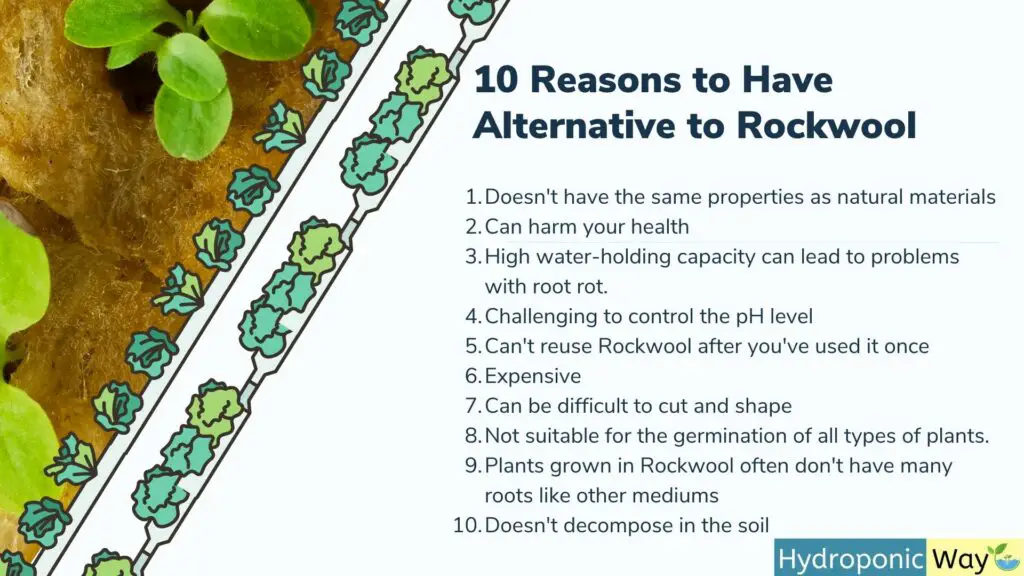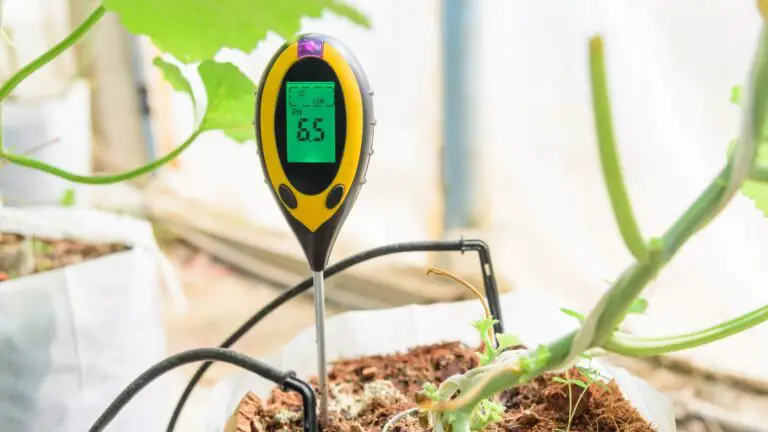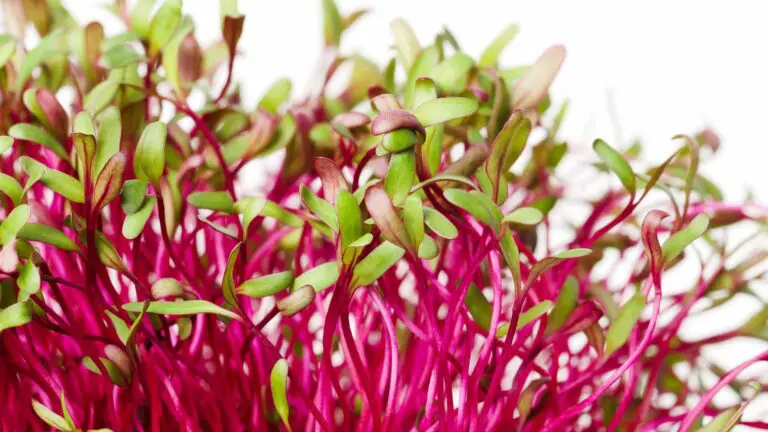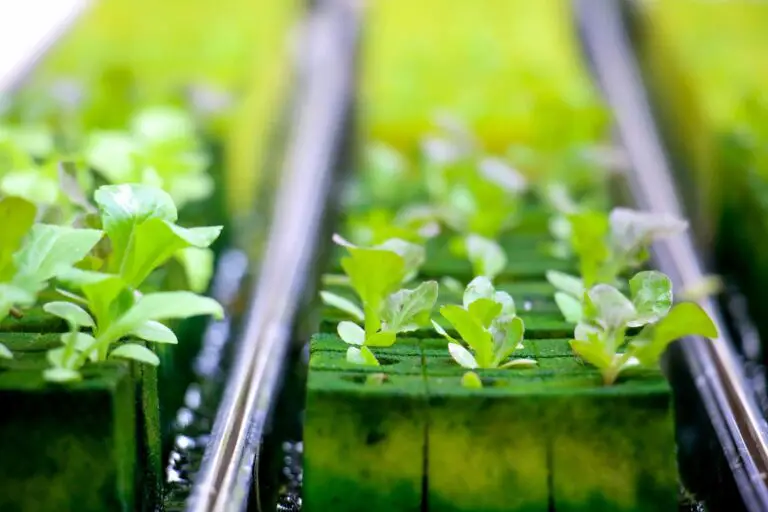10 Reasons to Have Alternative to Rockwool
Disclosure: Your purchases through our links may earn us a small commission, supporting our site’s ability to provide valuable information to our readers. Rest assured, it won’t impact your price. Thank you for your support.
Rockwool is a popular insulation material, but it’s being used as a growing medium in hydroponic grow operations.
It has several advantages, such as being lightweight, having a high water-holding capacity, and providing good drainage.
Rockwool is also sterile, so it doesn’t introduce any diseases or pests to your grow operation.
One of the most significant advantages of Rockwool is that it’s easy to control the pH level. This is important because plants can only absorb nutrients if the pH level is correct.
Rockwool is also available in different sizes and densities. The size and density you choose will depend on the type of plants you’re growing and your budget.
You can find Rockwool at most hydroponic stores or online.
Here are ten reasons for the need to use an alternative to Rockwool and how to overcome them!
1 . Rockwool is man-made, so it doesn’t have the same properties as natural materials like coco coir or rice hulls.
Rockwool is made from rock or slag, so it doesn’t have the same properties as natural materials. It’s essential to keep this in mind when choosing a growing medium for your plants.
Related: What Do You Need to Know About Rockwool Production?
2 . Rockwool is made from rock and glass, which can harm your health. It can irritate your skin, eyes, and respiratory system.
There are two main types of Rockwool: basalt rockwool and slag rockwool.
Basalt Rockwool is made from melted and spun basalt rock. Slag Rockwool is made from the waste material that’s leftover when steel is produced.
The problem with Rockwool is that it can release harmful chemicals into the air. These chemicals can cause skin irritation, respiratory problems, and eye irritation.
You can also dampen Rockwool before working with it to reduce the amount of dust that’s created.
If you’re using Rockwool in your grow operation, it’s essential to wear a mask and gloves when working with it. You should also ventilate your grow room to prevent the build-up of these harmful chemicals.
3 . The high water-holding capacity of Rockwool can lead to problems with root rot.
To avoid problems with root rot, you can water your plants less often or add perlite or gravel to Rockwool to improve drainage.
You can also add an air pump and air stone to your hydroponic system to improve oxygenation and prevent problems with root rot.
If you’re using an aerated hydroponic system, you can water your plants less often. Read “How Often Should You Water Seedlings in Rockwool Hydroponic” to learn more.
You should also check the roots of your plants regularly and remove any that are starting to rot.
4 . It can be challenging to control the pH level when using Rockwool.
It’s essential to test the pH level of your Rockwool regularly and adjust it as needed. You can use a pH meter or test kit to do this.
You should also add limestone or dolomite to Rockwool to help raise the pH level.
If you’re using an aerated hydroponic system, you can also add a bubbler to help raise the pH level.
It’s essential to adjust the pH level of your Rockwool regularly to ensure that your plants can absorb nutrients.
If you’re looking to buy a digital pH meter, Amazon has reviewed the top of the best, as shown by this affiliate link, at no extra cost to you.
5 . You can’t reuse Rockwool after you’ve used it once.
There are some types of Rockwool that you can reuse, so check before you discard them.
Rockwool can generally last a long time if Rockwool isn’t utilized correctly. However, it is best to disinfect a new one after three uses and, most importantly, use a fresh one.
You can reuse the Rockwool, that used for insulation as growing medium. But it needs to treat properly before using as explained in the article how to treat insulation rockwool for hydroponic growing.
If you can’t reuse it, you can compost Rockwool or add it to your garden as mulch.
You should check to see if your Rockwool can be reused before discarding it.
If not, you can compost it or add it to your garden as mulch.
6 . Rockwool is expensive.
If you’re on a budget, you can look for Rockwool on sale or use a less expensive alternative like coco coir.
Coco coir is a popular alternative to Rockwool made from the husks of coconuts. It has a similar water-holding capacity, and it’s also easy to control the pH level.
If you need to learn more, check out this post, seven cheapest alternatives for Rockwool.
Related:
Rockwool vs. Coco Coir: Which Is the Right Choice for You?
Coco Peat vs Coco Coir: What’s the Difference?
7 . Rockwool can be difficult to work with because it’s so dense. Rockwool can be difficult to cut and shape.
When working with Rockwool, it can be helpful to soak it in water before you try to cut or shape it.
You can also use a sharp knife or scissors to make it easier to cut.
8 . Rockwool is not suitable for the germination of all types of plants.
Rockwool is not suitable for plant germination that requires high levels of humidity. If you’re growing plants that require high humidity levels, you should use an alternative.
9 . Plants grown in Rockwool often don’t have many roots as plants grown in other mediums.
If Rockwool blocks are crowded together, the roots will be unable to grow through all of them simultaneously and may get tangled up, preventing development.
Also, this can be a problem if you’re trying to grow plants that need a lot of roots, like tomatoes. If you’re growing plants that require a lot of roots, you may want to consider using another medium like coco coir or perlite.
10 . Rockwool doesn’t decompose in the soil
Unlike many other media, Rockwool does not decompose, fracture, or break down with time. This means that it can stay in the soil for a very long time, which is not ideal if you’re improving your soil quality.
If you want to use Rockwool in your garden, you should remove it before planting new plants. You should also avoid using it near sensitive plant species like ferns.
However, Rockwool should be steamed or at least boiled water to kill any potential diseases before replanting.

Bottom Line
There are many different growing mediums available for hydroponic grow operations, so don’t feel like you have to use Rockwool because it’s one of the most popular options.
We hope this list has helped you understand some of the potential drawbacks of using Rockwool and how to overcome them.
If you’re looking for an alternative to Rockwool, coco coir is a great option. Coco coir is made from coconut husks, and it’s 100% natural. It’s also easy to work with, and it’s very versatile. You can reuse coco coir multiple times, and it’s easy to control the pH level. Coco coir is also a great option if you’re concerned about your health because it doesn’t contain any harmful chemicals.
Perlite is another great alternative to Rockwool if you’re on a budget. Perlite is a natural volcanic rock that’s been heated until it pops. It’s very lightweight, and it has a high water-holding capacity. It’s also very easy to find, and it’s very inexpensive.
You may read twelve alternatives to Rockwool for hydroponic farming to know more growing mediums available.
No matter your reason for looking for an alternative to Rockwool, there are plenty of great options. So don’t be afraid to try something new!
Thank you for reading!
Also, read:
How to Choose the Right Size of Rockwool for Hydroponic Growing System?
How to Increase the Germination Rate in Hydroponic Rockwool?
6 Easy Steps to Prevent Algae Growth In Rockwool
If you are looking to buy rockwool, coco coir or perlite for your indoor or outdoor garden click the following links to select the best one suited for you.




